May-Jun 2004
'Its A Small Church But It Contains The World'
By Sister Lourdes Fernandez MM
 Albania is a small country in South Eastern Europe known not only as the birthplace of the parents of the Blessed Mother Teresa but also because of its extraordinary history. The Albanian people and the Church suffered severe religious persecution under Communist rule. By the 1980s, albania had become the most isolated country in the world. In 1995, the Maryknoll Sisters found their way there. Here Sister Lourdes shares with us their experience in the land tha once was declared by Communist dictator Enver Hoxha as 'the world's first completely atheist state.‘
Albania is a small country in South Eastern Europe known not only as the birthplace of the parents of the Blessed Mother Teresa but also because of its extraordinary history. The Albanian people and the Church suffered severe religious persecution under Communist rule. By the 1980s, albania had become the most isolated country in the world. In 1995, the Maryknoll Sisters found their way there. Here Sister Lourdes shares with us their experience in the land tha once was declared by Communist dictator Enver Hoxha as 'the world's first completely atheist state.‘
On May 1, 1995 the Catholic Church started activities in Pogradec,’ Veronika recalled, ‘and it brought happiness to my family.’ Veronika and four other young persons were baptized at Easter 1997 when Albania was in turmoil. ‘The darkness and ugliness of gunfire surrounded us but inside our hearts was a fire of joy and love,’ she said.
Healing their broken wings
A deep ethnic conflict between Serbs and Kosovar Albanians had the Balkan peninsula in crisis once again in 1999. Kosovar refugees fled to neighboring Balkan states. Our small community reached out to refugee camps in Pogradec until the day of ‘liberation.’ The compassionate energy of our youth was an education in peace building between the Kosovar Albanians and ethnic Albanians. It inspired me to start a project to enhance the missionary character of our newly baptized Catholic youth. This was a live-in community in mission that went on for three consecutive summers. We started each day with morning prayer and gathered in the evenings for reflection and prayer. We filled our days with a variety of ministries, visiting the sick in the hospital, meeting with groups of children, youths, women and a few men. A married couple we met in one of the villages were very curious about us. They questioned us like ‘interrogators.’ We responded patiently and soon enough their facial expression transformed them into bright-eyed little ‘children’ fascinated with a new discovery. ‘What is prayer? Teach us to pray. We were living in darkness even before Communist rule. This village has nothing of that, no mosque, no church. We thank you for coming.’
Veronika Sharing with the Community how and why she came to the Church

Christmas scene in our little church
Our presence attracted attention from the drivers and passengers on the mini-buses we took going to the villages. The young missionaries weren’t short of words with people of all ages including their own family members who had doubts about what their mission project. A parent asked his two daughters, ‘What do you gain from this “mission”? Are you running away from life?’ Sara and Ester assured him, ‘On the contrary we are closer and learning much about life. You work hard to keep your family alive and happy. You get very tired from work as a day laborer, but you are thinking not only for yourself but of others. That is mission. Mission is learning and helping. It’s a chance to gain a better life.’ The two considered the encounter a very special mission. ‘For the first time we had a peaceful conversation with our father. After all these years he listened and believed’
Powerhouse
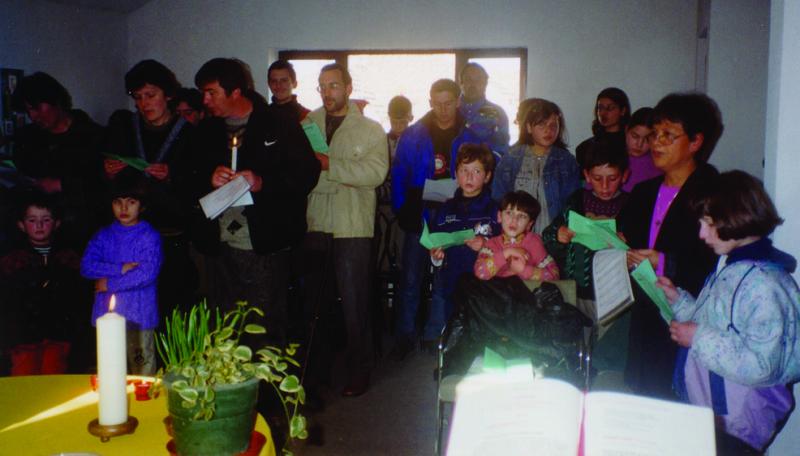
Veronika Sharing with the Community how and why she came to the Church
Because of the Crucified
Christ Our sixth anniversary was also very special. At the homily, community members simply shared what led them to the Church. One told us, ‘I came to learn English but when I entered the building the statue of a man nailed to the cross struck me. I wanted to know why he was crucified. My classmate invited me to come and see, and here I found myself and God. The beginning of the Church was a beautiful experience of following God and I responded, “I am here.” I’m emotional because six years ago we created this community of St Joseph the Worker Catholic Church. I had been to other churches before but was mysteriously captivated and found God in this small church. It’s my joy and desire to continue with this community and I pray that it will bear much fruit not only in Albania but beyond. I enjoy knowing the Maryknoll Sisters and my life is completely changed.’Discovering the Light
Christmas 2001 was very special in this pioneering mission of the Maryknoll Sisters. The Christmas Vigil Liturgy prepared by the youth was a very unusual drama - the birth of Jesus in Pogradec. It was the Christmas story of our community. Christmas! The night when Jesus came to give light to the whole world that was in darkness. We were once in darkness and didn't know about God. But today, how strangely we have changed, how very different we have become. We see a new life, a different world that is very beautiful, an entirely changed world. We see a new Pogradec, like a new Jerusalem, brightly descending from the heavens. And we hear a gentle voice, 'From today onward, I am your God in your midst. You will be called “Little Candles.” You will be a light in dark corners to bring light back to this town. Your candlelight will never be extinguished. I will make you strong. I will make everything new for you. Shine, O Little Candles and light other candles for the world.'Young and Zealous
On the feast of the Epiphany, ten members made a promise to be Little Candles to bring the light of faith to others and into the dark peripheries of life. I see them as a third millennium equivalent of the earliest Christian missionaries; like the little ones who had seen and followed the star; like Mary Magdalene sent by Jesus to tell the brothers and sisters that he is the Risen Christ. Today, they are spread out in different areas: Ina, Kristina and Valentina in Tirana, Paola, Maria, Mark and Veronika in Elbasan, Anxhelina and Ester in Pogradec, Sara in Neuberg, Germany, confronted with confronted with trials and challenges but never giving up.I’m back at our Center in Ossining, New York, for a while but am still very much with them in mission through email. Their faith commitment and enthusiasm for mission attract curiosity and participation in peacemaking and community building. When people ask them why they do the things they do and how much money they get in return, they reply, ‘Gift freely received, gift freely given.’
You may write to: Sr Lourdes Fernandez MM Maryknoll Sisters Center PO Box 311, MARYKNOLL NY 10545-0311, USA Email: lfernandez1943@yahoo.com
An Open Letter To Filipino Catholics
By Steve Ray
Steve Ray is the author of many best-selling books, eg, Crossing The Tiber (his conversion story), Upon This Rock (on the papacy), and recently, St John's Gospel (a comprehensive bible study guide and commentary). Steve is also currently filming a 10-video series entitled, Footprints of God. The first two videos are out: Peter, Keeper of the Keys and Mary, Mother of God.
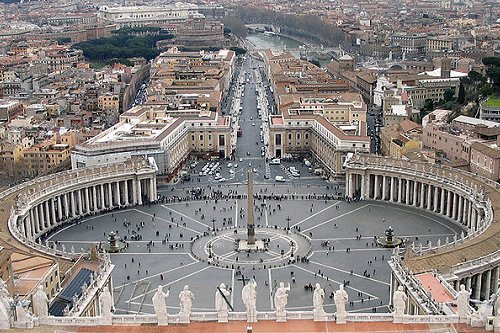
This article is used with permission of The Filipino Catholic Ministry, Milwaukee, Wisconsin, USA. You can access their website with either www.filipinocatholicministry.com or http://fcm8.tripod.com
We stepped into the church and it was old and a bit dark. Mass had just begun and we sat toward the front. We didn't know what to expect here in Istanbul, Turkey. I guess we expected it to be a somber Mass, but quiet and somber it was not. I thought I heard angels joyously singing behind me. The voices were rich, melodic and beautiful. What I discovered as I spun around to look did not surprise me because I had seen and heard the same thing in other churches around the world. It wasn’t a choir of angels with feathered wings and halos but a group of delightful Filipino Catholics with smiles of delight and joy as they worshiped God and sang his praises.
I had seen this many times before in Rome, in Israel, in the USA and other countries. Filipinos have special traits that were beautifully expressed as I gazed at the happy throng giving thanks to God in Istanbul.
What’s so special about Filipinos?
What are the special traits which that I’ve noticed - personal observations - as I’ve traveled around the world, including visits to the Philippines?
First, there is a sense of community, of family. These Filipino Christians did not sit apart from each other in different pews. They sat together, closely. They didn't just sing quietly, mumbling, or simply mouthing the words. No, they raised their voices in harmony together as though they enjoyed the sense of unity and communion among them. They are family even if they are not related.
What is inside?
Second, they have an inner peace and joy which is rare in the world today. When most of the world's citizens are worried and fretful, I have found Filipinos to have joy and peace - a deep sense of God's love that overshadows them. They have problems too, and many in the Philippines have less material goods than others in the world, yet there is still a sense of happy trust in God and love of neighbor.
Love for Mary
Third, there is a love for God and for his Son Jesus that is almost synonymous with the word Filipino. There is also something that Filipinos are famous for around the world - their love for the Blessed Mother. The affectionate title for Mary I always hear from the lips of the many Filipinos I’ve met is ‘Mama Mary.’ For these gentle people Mary is not just a theological idea, a historical person, or a statue in a church - Mary is the mother of their Lord and their mother as well, their ‘mama.’
Exporting missionaries
The Philippines is a Catholic nation and exports missionaries around the world. These aren’t hired to be missionaries, nor official workers of the Church. No, they’re workers and educators, doctors, nurses and housekeepers that go to other lands and travel to the far reaches of the earth, and everywhere they go they take the joyous gospel of Jesus with them. They make a somber Mass joyful when they burst into song. They always keep the love of Jesus and the Eucharist central in their lives.
More than the world’s riches
My hope and prayer, while I am here in the Philippines sharing my conversion story from Baptist Protestant to Roman Catholic, is that the Filipino people will continue to keep these precious qualities. I pray that they will continue loving their families, loving the Catholic Church, reading the Bible, loving Jesus, his Mother and the Eucharist. As many other religions and sects try to persuade them to leave the Church, may God give them the wisdom to defend the Catholic faith. As the world tempts them to sin and seek only money and fame and power, may God grant them the serenity to always remember that obedience to Christ and love for God is far more important than all the riches the world can offer.
May the wonderful Filipino people continue to be a light of the Gospel to the whole world!
An Ordinary Woman And Mother Of God
Adapted from Bogoroditza by Catherine Doherty
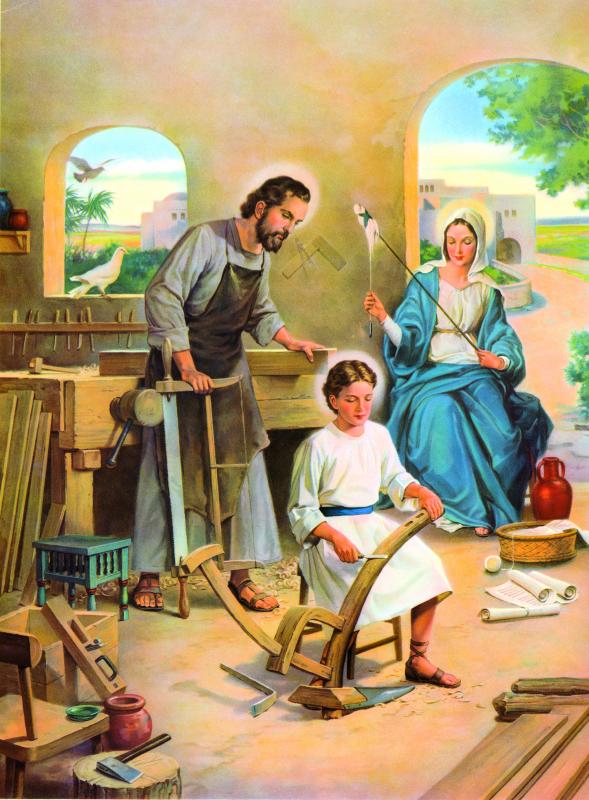
Consider Mary as she really is. Everybody glorifies Our Lady. Of course she is to be glorified. She is the Mother of God. But I would like to tell of her ordinary life. There are many women like me who feel that she is so high up that nobody can touch her. It is true that she is high up, but she is also very ordinary.
What did she do all day? I imagine she washed and scrubbed and cleaned. She was married to a carpenter. She wasn't a big shot in Nazareth. Nazareth was a small town. Joseph wasn't a big shot, just a carpenter. She tended to her husband and Son, especially when he was small. She cooked, she scrubbed and she washed and wove and attended to the garden and did the laundry. Our Lady was the first person who really knew how to do the will of God in its minute details.
I revel in her normality because she is ordinary and at the same time extraordinary. It was an ordinary household and that is a most fantastic thing. Our Lord chose for his mother a working woman; that's what she was, a working woman.
She got up in the morning, and on some days of the week carried the laundry to the pool. The women of Nazareth must have come to her constantly because she was who she was. She must have kept, not a cookie jar, but the Eastern sweets that all the Eastern people love, and children must have come to her.
I think of her in realistic terms, but I also think of her as the woman with the power to stand silently under the cross of her Son, and in some sort of an incredible way, I understand that at that moment she became the mother of all humanity, for whom he died.
She's the woman of speech and she's the woman of silence. She's stronger than an army in battle array and as weak with God as only a woman can be. She dusted and she cleaned. And she cooked and she knew how to weave. She wove his seamless garment. Her life was a sea of small things so infinitely small that they're almost not worth mentioning. The corn had to be ground, her house swept, the meals prepared; day after day the Mother of God did those things.
From her we can learn the quality of listening, and of taking up the words of others as well as the words of God, holding them in our hearts until the Holy Spirit cracks them wide open and gives us the answer as he did to her as her Spouse.
You asked me to explain who Our Lady is. You could say that she's the gate. She's the gate to the way to the Father, because it is through her that Christ came to us and it is through her that we return to him.
Who is Our Lady? A woman like you and me. She is someone to whom my heart goes out all day and who is with me as a friend, and with whom I can talk.
We all should talk about her Son. For you see, she changed his diapers and he drank her milk, and she kissed his boo-boos away like any woman does to a toddler. He scratched himself, so she kissed it away. He went, and he fell and he got up and he grew up, and she probably said, “Eat your porridge,” and she probably said, “Don't forget your sandals. It's wet.”
Who has lived with God as Mary has lived with him? To whom can we go and find out that he is really a man? From whom shall we know the Incarnation better than from the woman who carried him in her womb nine months?
How can anyone talk about throwing out devotions to Our Lady? Do you want to throw out the woman who was pregnant with God and who will never lead you away from him but always to him?
We think of her as the queen of the angels, and queen of the universe, which she is. But you see, God was a carpenter and she was a housewife. And God is in heaven and he still has calloused hands in his glorified body. And she, who also has been assumed into heaven and has a glorified body, still has hands that show she was just a working woman. She is all things to all people because she is the mother of mankind.
How can we not love her? How can we not go to her, run to her? She has the secret of everything, now that she is where she is. And when we worry about some kind of a mystery or have a hang-up on something or other in spiritual matters, why don't we go to her? She'll say, “Oh relax, kiddo. Let us sit down and talk.”
What a strange thing it is that God chose her. Because she is the gate through which he came to us, she is the gate wide open for us to go through to him.
Close Encounter With The Teenage Kind
By Veronica Ugates
Libya, whose economy is dominated by oil, forms part of the vast Northern African Plateau extending from the Atlantic to the Red Sea. About 90% of the population lives in and around the coastal cities, especially Tripoli and Benghazi. Veronica Ugates has been living there for two decades now. She wrote for Misyon a few years ago and now she shares with us once again how she and her family are doing . . .
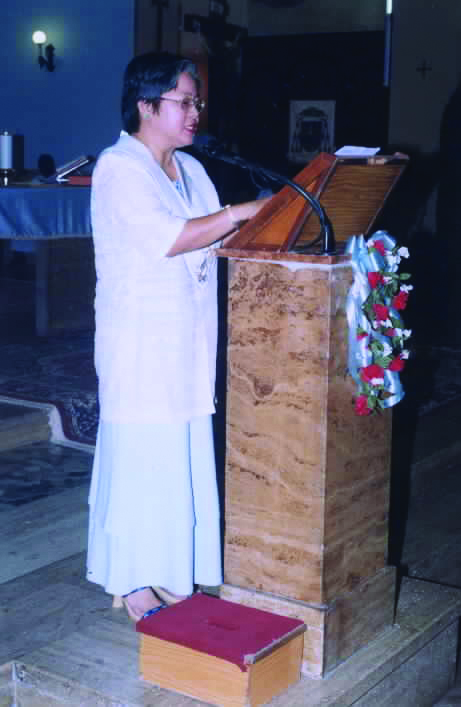
Veronica Ugates
When our daughter was about 14 we started to feel the lack of social life for a teenage girl. We observed that the youth program of the Church had not pushed through due to many hindrances, one of which was the lack of personnel. So we offered our services and reactivated the St Francis Youth Ministry in October 2002.
Having only enthusiasm but no experience, my husband researched on the internet for a comprehensive program for the young and scoured the bookshelves of the church for any material that could help us.
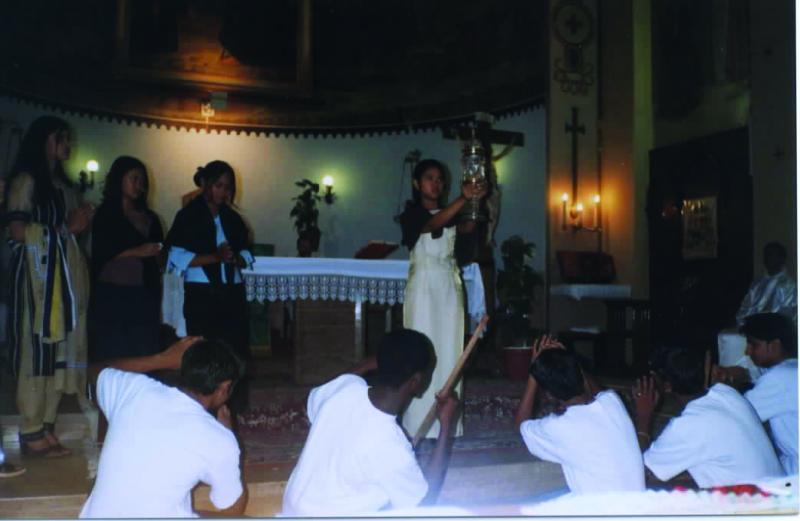
Portraying the life of St Clare
Youth center founded
Slowly but surely with God’s grace, we found friends who might not have had time but who supported us financially and with whatever talents they could share. Filipino and Canadian friends in Tripoli gave money to buy musical instruments, CDs, a microphone stand and indoor games such as darts, chess and table tennis. Mrs Nini Jaramillo served as our music mistress. Dra Corinelia Moreno was our resource person in giving lectures on the physiology of the developing adolescent body. Meanwhile the youth, especially the Pakistanis, helped in painting and renovating the youth center that Bishop Giovanni Martinelli OFM gave for our use. They also made the table for table tennis. My husband provided the formation materials and served as speaker while I functioned as the general coordinator for speech, drama and whatever else that needed doing.
We started with about 36 Filipino teenagers, augmented later by 12 Pakistanis, an Armenian and a Gambian who got interested. So far we’ve participated in the candle-lighting ceremony of Christmas 2002, sponsored a youth-parent acquaintance party in celebration of Family Week in January 2003, presented the Via Lucis or ‘Way of Light’ at Easter 2003, and joined in the 100th anniversary of the Sisters of the Sacred Heart on 1 June 2003.
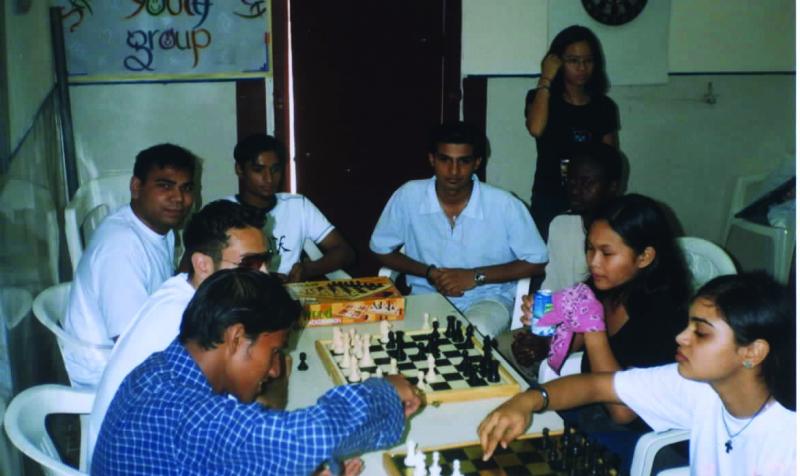
St Francis Youth Group
Coping with change
Many Filipino members went home to the Philippines for their college education and we thought the center might lose its attraction for them. If everybody went home there’d be no more members. But we didn’t stop being there for them. Some Arabic youth also found their way to the center.
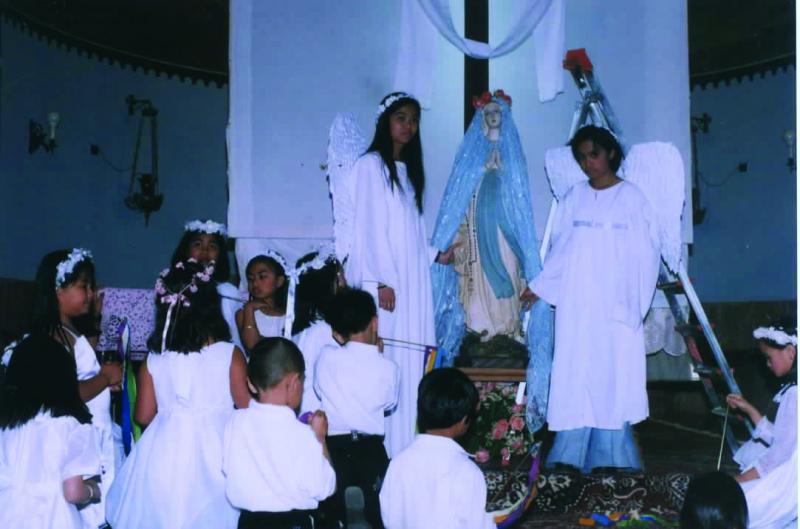
Easter Celebration
On 8 August, three days before the feast of St Clare, we dramatized excerpts from her life. We also presented the Joyful Mysteries on 15 August, Assumption Day. We have also participated in a concert for the feast of St Francis. We had Saturday rehearsals and formation sessions every Friday.
In search of truth
After one of these presentations a young Pakistani approached me. He brought the Bible and asked where he could find the greatest commandment of God. I explained that Catholics hardly ever memorize the Bible chapter and verse but that we try to live the life that it teaches. I asked him to look for the verse instead. He found Mk 12:30, ‘You must love the Lord your God with all your heart, with all your soul, with all your mind, and with all your strength.’ When he pointed it out to me I said ‘yes,’ not knowing what was to follow.
He then asked me, ‘What is heart?’ I replied that it’s not really the organ of our body but our will. He then asked, ‘What is will?’ I answered that it’s our decision-making ability. For example, you’d prefer to lie in bed and not go to church but your will makes the decision to go. Then, ‘What is soul?’ I told him that Catholics believe it’s the part of you that presents itself to God when you die. We leave our physical body behind and present to God only our spirit or soul. Another question, ‘What is mind?’ ‘It’s our intellect.’ Then, ‘What is intellect?’ ‘Our ability to decide whether we’re doing right or wrong.’ ‘How do you know you are doing right?’ I told him that the right decision is reached with the grace of God. ‘What is grace?’ ‘It’s the gift bestowed by God on those who follow His teachings.’
The answers
I thought the questions would never end but we finally reached the last, ‘How did you know all these answers?’ ‘Firstly, because God gave me the grace to be able to answer your questions; secondly, I read a lot because the Pope said that ignorance is the enemy of our Catholic faith; and thirdly, because I had anticipated that I might have to answer such questions from a smart person like you.’
Until then I hadn’t realized that adults often for granted simple things that the young consider
Dampier Peninsula Mission Experience
By Sr Mary Ignatius C Aquino OSB
Sister Ignatius, who has written before in these pages, tells of her experience in forming the first Tanzanian members of the Missionary Benedictine Sisters of Tutzing. This congregation, founded near Munich, Germany, opened missions in the Philippines and in Tanzania in 1906.
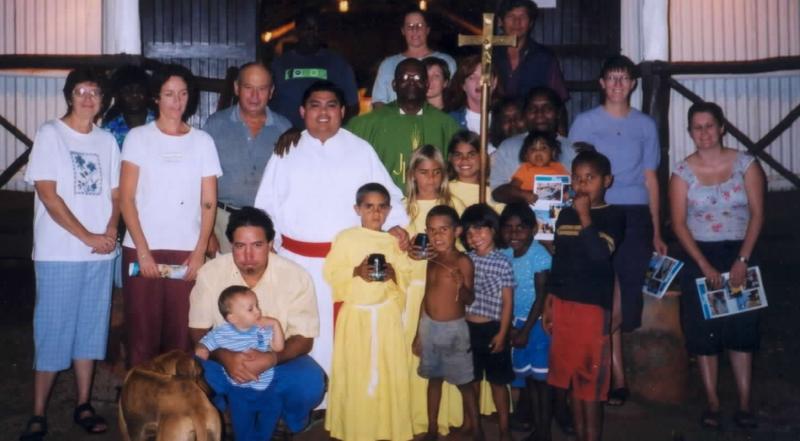
Seven years as a formator at Ndanda Priory, Mtwara, Tanzania that came swiftly to a graceful end. I came on 13 June 1995. I noticed on my arrival from Dar-es-Salaam, the capital of this East African country, that it was like an oasis in this dry, hot and bushy village. This area has been under the jurisdiction of the Benedictines since 1906. Both Benedictine monks and the Missionary Benedictine Sisters of Tutzing work here. The Ndanda Mission has provided health care and educational development throughout Tanzania through its large hospital and secondary school and a housing complex for doctors, teachers and staff.
Most of the Sisters in Ndanda are Europeans in their 60s, 70s and 80s. It took almost a century to open the door to Tanzanians. Since 1995 we’ve had seven Junior Sisters from the Ndanda Priory Novitiate. Their radiant, happy faced added to the joy of the First Profession of two novices on 12 October 2002.
Formation is a gradual process of transformation into Christ. As I look closely at those faces, including my own, I am delighted at the marvels the Lord has done to our young Sisters and to me. We started like children learning to walk, I in a foreign land and they as beginners in the ‘School of the Lord’s Service.’ It was our Lord Jesus Christ, the Formator par excellence, who led us all along: in sickness and in health, in poverty and in abundance, in failure and in success, in losses and in gains, in tears and in joy. Yes, God accompanied and loved each of us all the way through.
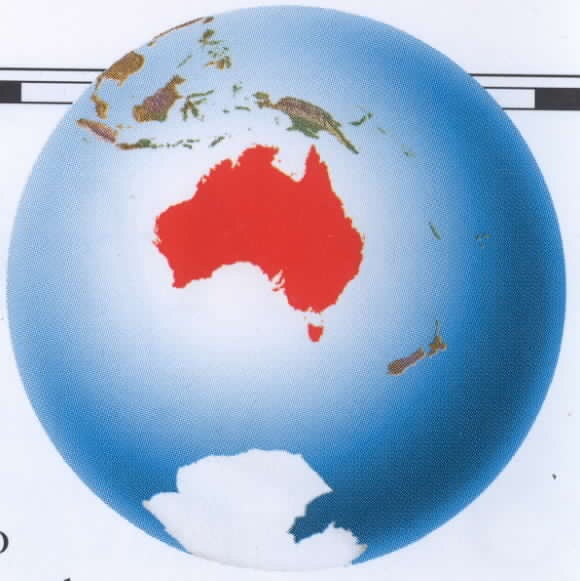 Leaving Ndanda Priory, my heart is full of peace and happiness as I see the seven young Tanzanian Junior Sisters ready and joyful in committing themselves to our Missionary Benedictine way of life. With these seven seeds that have sprouted and are gradually unfolding into what God has intended, we go forth to draw all peoples towards God as we pray, live and work in common.
Leaving Ndanda Priory, my heart is full of peace and happiness as I see the seven young Tanzanian Junior Sisters ready and joyful in committing themselves to our Missionary Benedictine way of life. With these seven seeds that have sprouted and are gradually unfolding into what God has intended, we go forth to draw all peoples towards God as we pray, live and work in common.
My missionary service continues in Los Toldos, Argentina. This assignment evoked in me an awesome wonder as the thought of going to this South American country had been lingering in my mind in Ndanda. One day, while I was at Chem-Chem, a water spring, I said to one of the novices, ‘My next foreign assignment will be Argentina.’ When Mother General Irene Dabalus OSB, the first Filipino in that post, subsequently missioned me to Los Toldos, I felt as if a mysterious event had happened to me. May I faithfully live this mystery!
From The Philippines To Belgium
By Sr Mary Carmela OCD, Sr Bernadette Marie OCD and Sr Rose Ann OCD
Sister Mary Carmela went to Vilvoorde Carmel in Belgium from the Carmel in Cebu with Sister Bernadette Marie from Zamboanga Carmel and Sister Rose Ann from Manila Carmel. You can learn more about Vilvoorde Carmel at www.dentroost.be .

We three Filipino Carmelites are happy to be here in Vilvoorde! We are grateful that the Lord has enabled us to respond to His call and brought us here despite our unworthiness and limitations. We only believe that it’s the Lord who will do things for us and in us. So, with Our Blessed Mother Mary, we just have to cooperate and give our faith each day of our spiritual journey.
Warmth of Belgium
When Mother Ann Christi told us to write our first impressions of Belgium, we asked ourselves, ‘Are we in a position to give a realistic impression of the country when we haven’t yet seen much of it since we arrived?’ On the other hand, we didn’t want to miss this opportunity to express our gratitude to those who have shown kindness and generosity to us.
Our first experience of Belgian hospitality was when the kind, smiling and good-looking Philippe met us at the train station in Brussels. He was like a long-lost friend because we felt at home with him at once. He was there with Mother Ann Christi and took care of our luggage. Then, the very warm and loving embrace of our dear Mother Ann Christi made us all the more at home.

Closed Cathedral
Brussels to us was just like any capital city. When we went to St Michael’s Cathedral to attend Mass we had our first disappointment. Though Sunday afternoon, it was closed - unthinkable in thePhilippines. We found an open door at the side but the young lady there said she’d be closing in a minute. So, we hurried out and went to the crypt but there was no Mass there. So, for the first time in many years in religious life, we missed Sunday Mass, the ‘summit’ of our day and the ‘source of our strength.’ But we knew in our hearts that the Lord understood our predicament. However, the sweet welcoming smile of those whom we passed by, especially a few sitting outside the Basilica’s main door, lessened our disappointment. The warm and loving welcome of our Sisters when we reached our new home-Carmel wiped it away.
No longer in the Philippines
We were wondering, however, on our way why there were so few people on the streets and most of them not young. We were told it was summer holiday time, so many were on vacation. Stores were closed. The opposite is true in the Philippines because you find the streets and malls all the more full, especially with young people, at holiday times. We had to remind ourselves that we were no longer in the Philippines but in another continent with a different culture and customs. Still, we can’t help but recall from time to time our beloved country, our home for so many years.
Taste of Countryside
Despite being in a first world country, we found the Belgian people simple, quiet and composed. The smiles on their faces radiated peace and tranquility, like the city of Vilvoorde! Entering the city, we noticed at once the simple but beautiful houses abounding with flowers and trees among clean surroundings. We got the impression that we were in the countryside but then noticed the city’s main thoroughfare. Some streets and buildings, especially our monastery, gave us a sense of antiquity.
Promise of the Future
What a privilege to be here, to be reconnected to our Carmelite beginnings particularly at this time when the Holy Father in his recent apostolic exhortation Ecclesia in Europa urges us to ‘remember our roots.’ Coming to Vilvoorde Carmel is not just remembering, but becoming a part of our roots in the Order because this was the very first community of Carmelite Nuns, founded by Blessed John Soreth in 1469. As we journey with our new community and with all connected to Carmel, we look forward to a future full of hope and promise that one day Europe will rediscover its greatest treasure, its Christian Faith. However, we still see it very much alive in the hearts of those whom we’ve met so far, especially in Jan and Iny Goyvaerts and their children, in our associates and the regular churchgoers whom we met on August 15.
Heaven on Earth
Sunday Mass made a deep impression on us because the people really participated in the singing and the rest of the liturgy. If only more young people rediscover its beauty and contribute their talents to the enhancement of the Sacred Liturgy, more and more will fill up the churches, not only on Sundays but even on weekdays. We wonder if there are still other couples or families like the Goyvaerts just waiting for the right time and opportunity to be instruments of revival and be a leaven in the Mystical Body of Christ. God can make use of anyone or anything, however weak and insignificant, to bring about and spread His kingdom on earth. He can use you and me in the way He wants to for His greater glory and honor and for the good of the Church. Since we are the heart of the Mystical Body, we have a vital function to carry out with our prayers. Only with God’s grace shall we be able to do what God expects of us: to be a powerhouse of prayer in and for the Church.
For the Catholic faith that we received through the Spaniards and for our French foundresses who brought Carmel to the Philippines, we shall always look to Europe with gratitude. This we bring in our hearts to the heart of the old continent.
In the words of Pope John Paul, ‘Let us go forward in hope’ with Onze Lieve Vrouw van de Troost, Our Lady of Consolation, as ‘the radiant dawn and sure guide for our steps.’
You may contact Sisters Mary Carmela, Bernadette Marie and Rose Ann at: Karmelklooster, Trooststraat 2, 1800 VILVOORDE, BELGIUM or at dentroost@busmail.net .
From ‘Vertical’ to ‘Horizontal-Vertical’
By Amparo Batutay
 The author is a Misyon promoter. Here she shares her struggle to grow into the post-Vatican II way of living our faith.
The author is a Misyon promoter. Here she shares her struggle to grow into the post-Vatican II way of living our faith.
An old song says, ‘It’s better to have loved and lost than never to have loved at all.’ These words have significance in my life.
Before I started my formal schooling at the age of 7, I had already received my First Communion, studied the basic Spanish alphabet and memorized the old little booklet of the catechism. Though born in Cebu City, I was raised in Boljo-on, a sleepy, quiet romantic town in the southeast of Cebu, with verdant mountains majestically towering over white sandy beaches where bathers stretch lazily and enjoy the lapis lazuli sky over a shimmering azure sea.
The way things were
Our parish priest at that time was Father Moran, a Spanish Augustinian friar and a very strict disciplinarian. Every Sunday after High Mass we preschool children were gathered in the parochial school to study the Spanish alphabet and the Doctrina Cristiana. We were made to memorize the whole booklet. When we passed the teacher’s oral examination, our parents were informed in order to prepare for our internship before First Holy Communion. We stayed at the school, the girls occupying the second floor and the boys the ground floor. Our parents brought our food at mealtimes. Our house was just across the road but we weren’t allowed out.
Our daily routine
We were taught the basic Christian prayers, learned the Rosary, memorized all the questions and answers in the booklet and strictly followed the rules and regulations. At 6am we had morning praise and the Angelus, then washed and prepared for the day’s activities that began after breakfast –– study, prayer, singing, play, rest and sleep. After lunch at 12 we rested and resumed at 2:00. We had our snack at 3:00, then play and more study till late afternoon. We prayed the Angelus at 6:00, ate supper and prayed the Rosary at 8:00, followed by evening prayer and sleep.
Sometimes we helped cut the hosts with a round cookie cutter in the small bakery at the back of the convent. We were kept in the school for two or three weeks, depending on the learning capacity of the group. We were also taught how to go to confession and how to receive Communion. Respect for elders was strongly inculcated in us and we were told that it was a great sin to talk back to them. We looked up to the priest as second to God.
In other words, we were molded and brought up in a very rigid and religious atmosphere, following strictly the teaching of the Church. When we were ready, we were brought in front of the priest for the final oral examination. This was an ordeal. Once you answered his questions, such as ‘How many gods?’ ‘What are the Ten Commandments?’ and so on, you were ready for first confession and First Holy Communion. Then our parents were told to prepare the white dress and veil for the memorable occasion.
After the Mass there was a joyful celebration. We were treated to a sumptuous breakfast of thick chocolate, puto, suman andbroas cookies, delicacies of our place. After we kissed the hands of the priest, we gathered our belongings and went home with our parents.
Before and after Vatican II
Though our pre-Vatican II, Spanish-style religious training was rigid, it was clear and simple. It emphasized the individual’s ‘vertical’ relationship with God. For many years I happily lived my faith as I had learned it. Perhaps that was why I was so affected by the drastic change in the Church’s way of thinking after the Second Vatican Council, 1962 to 1965. It now emphasized our ‘horizontal’ relationships with one another and our common ‘vertical’ relationship with God.
It took several months of arguing and debating with the Redemptorist mission team that came to our parish after the Council and who took pains in helping me become what I am now. Sometimes we continued our discussions into the wee hours. Through the slow process of assimilation I woke up. It was a tremendous realization that the sign of Christianity, the CROSS, with its vertical and horizontal beams, symbolizes and unites the traditional way of living the faith that I grew up with and the new way. I can’t forget those people who worked hard to transform my outlook on life. I had been molded to think that salvation was only between the individual and God.
Faces of Christ
Then I came to realize, as Fr Martin Ryan CSsR once said, ‘There are so many Christs at the baybay without food, clothing and shelter.’ I came to understand the words of Jesus, ‘What you have done to the least of my brothers and sisters you have done to me.’ How true these words are! Salvation cannot be achieved by accumulating calluses on your knees by kneeling and praying for salvation while ignoring your poor brother’s plea for food, clothing and shelter, and much more, his pleas for justice. Salvation only comes from liberating others from the bondage of their misery. Mind you, it’s also self-fulfillment and self-liberation.
Savage gods
Many of us are enslaved by our greed: greed for power, wealth and prestige, so that these become little gods that control us. So we are chained by these vices that lead us to perdition. It is only in liberating yourself from these gods that you will be able to liberate others. And in doing so, you can be truly happy, contented and fulfilled individual. You will be free.
Going back to the lyric from the song, ‘It’s better to have loved and lost than never to have loved at all,’ I have no regrets at losing my traditional vertical way of Christian thinking because otherwise I could not have experienced my conversion to the true Christian way of thinking. There’s no comparison. I value much the realization that I can forget myself when others need me. Faith really does move mountains.
Getting To Know Some Travelers In Ireland
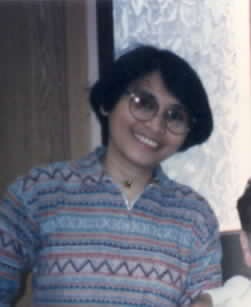
By Annie Budiongan
My three year term here in the only Columban parish in Ireland, St Joseph’s, Ballymun, Dublin, gave me a great opportunity to get a glimpse of the life and culture of Travelers, an ethnic minority with their own history, value system, customs and a nomadic tradition, part of Irish society for centuries. Their distinct culture can be seen in their dress, language, accent, family structures and use of symbols. According to the Department of the Environment there were about 28,000 Travelers inIreland in 1999, nearly a quarter in or near Dublin, the capital.
Grief of a child
I remember one morning hearing that a baby died of ‘cot death’ in a trailer, a traveler’s mobile home. She was put to bed a healthy baby and found dead in the morning. Father Val Kyne and I visited the family to extend our condolences. All the women were inside and all the men outside, a picture you might see back home in a similar situation. Some would say that women are good in consoling each other. This support greatly helped the parents to cope with their loss. What was more striking and touching for me was when I went to the pre-school attended by the two older brothers. The younger approached me, telling me the sad news, thinking I hadn’t yet heard. I nearly cried in front of him but managed to let him keep telling me how he felt. I got my lesson for the day about death from my three-year-old friend who, with a very shy smile, told me how proud he was of the sister he had just lost and how he had really loved her.
My Irish Lola
An old woman popularly known in the Travelers’ community as ‘Old Winnie’ made me feel that I had an Irish grandmother. She was in her 80s when she died, the same age as my lola who died when I was in first year high school. Every time I visited her I felt I was at Lola’s. At her funeral I felt I’d lost somebody who was very much part of me. We had shared a lot about life, family, frustrations, hopes and how we experience God’s loving hand in our lives. I felt the pain and the loss for I knew we had touched each other’s lives and forged a friendship that I will treasure all my life.
How far away is home?
Sometimes children call me ‘Chinese.’ Any Asian they see is ‘Chinese,’ just as at home we often call a white person‘Merkano’ or ‘Merkana,’ though they could be Irish or of any European nationality. Being away from home the more we treasure our own identity and nationality. That’s how I feel, anyway. They often asked me questions like ‘how far away is home?’ It’s actually not a matter of distance but of how often I could see my family. Isn’t it sweet for these kids to be concerned about my homesickness?
Family loyalty
You ask settled people ‘Who are you?’ and they’ll answer, ‘I’m a farmer,’ or ‘a postman’ or ‘a teacher.’ Ask a Traveler, ‘What are you?’ and the answer will be ‘I’m a McDonagh,’ or ‘one of the Joyces.’ Their identity is first and foremost with their family, not with their work or occupation. Family, both immediate and extended, is the heart of the Travelers’ community and family loyalty a very important value. Weddings, for example, are very big occasions and relatives expected to travel regardless of distance just to be there for the celebration. Girls marry as early as 16 or 17, some marriages arranged by the parents. Because families are so close and interconnected, if an individual needs help or is in trouble, the whole family becomes involved.
There are still Traveler families whose accommodation is temporary and on the roadside. At present 1,200 families are living on the roadside without toilets, water, electricity or washing facilities. Many taverns and hotels still refuse to serve Travelers, despite the law against this. It’s no wonder that Travelers feel discriminated against in their own society.
Travelers Account for 0.6% of Population of Republic of Ireland
Travelers make up 0.6% of the population, according to the latest figures released by the Central Statistics Office. The census found that Travelers are a very young population: 40% aged less than 15 years in 2002, as compared with 20% for the general population, and only 3.3% of Travelers are over 65, compared with 11.1% of the general population. The survey found that over half of all Travelers claimed to live in permanent accommodation, although a census official acknowledged that this figure was self-reported and may include mobile homes. Tuam, Co. Galway is the town with the highest proportion of Travelers - 7.7%. Some 73% of male Travelers and 63% of female Travelers are unemployed compared with 9.4% and 8% for the general population. Nearly two-thirds of those who answered the question said that their full-time education ceased before the age of 15, as opposed to 15% for the general population (www.emigrant.ie 2 February 2004).
I Learned From Their Story
By Sister Angelica Cruz ICM
How does one define the meaning of being a missionary? Not in the number of ‘converts’ made or the baptisms performed. Certainly not in the amount of money spent on projects, nor the size of the buildings constructed. For me it is from the stories they tell.
I’ve heard some of these stories from Sr Marieke, a fellow ICM sister. She is a native of Belgium and has been a missionary to the Philippines since the 1960s, with years in between out of the country for temporary assignments to Rome and Belguim. She has been involved in several ministries. Currently she is involved in Tahanang Walang Hagdan. Sr Marieke is a quiet person in the community. But with a little prodding, she comes alive when she talks of the people who have touched her life.
To be free like a bird
She told me of a little boy in Tahanang Walang Hagdan who, at the age of 8, was abandoned by his parents. One day, while they were sitting in the balcony, the boy remarked, ‘I wish I were a bird like that big bird over there. He’s not stuck in a chair like me.’ The boy has muscular dystrophy, a genetic disease characterized by progressive weakness and degeneration of the skeletal or voluntary muscles which control movement. She quietly carried him up from his wheelchair and placed him on her lap. Together they sat in silence.
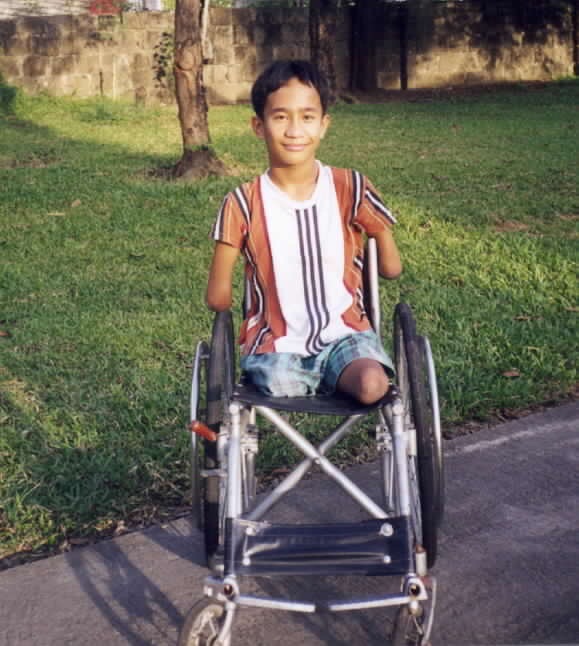
Lessons from the young
Then the story of a blind boy who reprimanded her by saying how much she still has to learn because she failed to return the trash can to its original place after sweeping the floor. And the two children who told her that she mustn’t look stern and anxious because they didn’t like to see her that way. Another was the story of the children who asked her why she didn’t have a hat when she needed one when working in the garden. They gave her one. Marieke still has it.
Armless painter
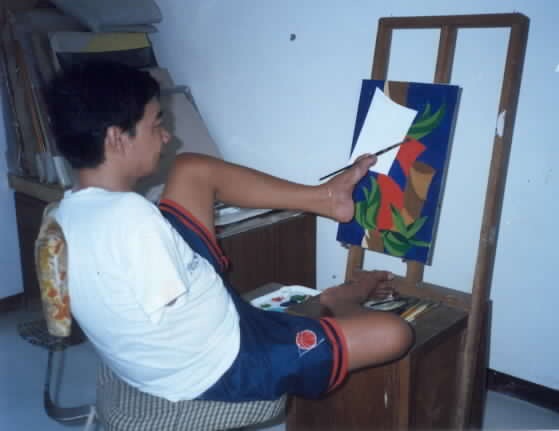
Finally, there was Amado who needed tips on courting. Who better to advise him than a nun? Of course, he got the girl! Amado is an artist. He was born armless. He paints with his foot. Sr Marieke saw this talent in young Amado and encouraged him. She accompanied him to the University of the Philippines and helped him to apply in the College of Fine Arts. He ranked third among the applicants who made it. After several days of commuting with him to UP, he told her one day that he could already manage on his own. Sr Marieke was just waiting for that moment. He finished his degree in between the dating tips. He sends his paintings to Switzerland and receives his salary in dollars! Amado is now married and his eldest daughter is already in college.
Stories yet untold
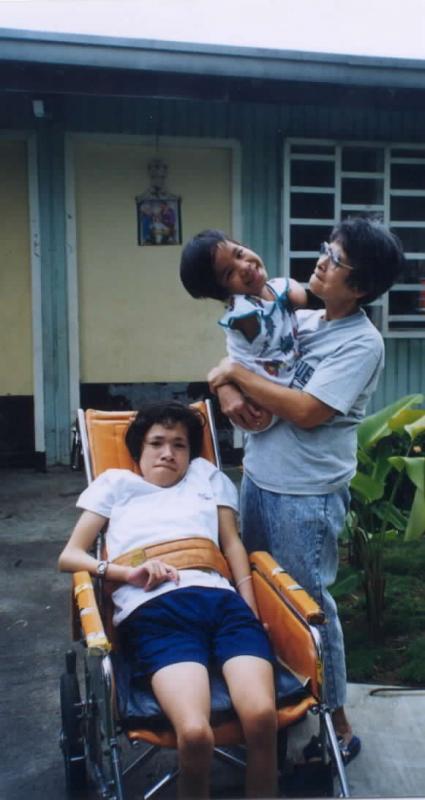
These stories showed me what being a missionary is all about –– the ability to see and appreciate the beauty of each individual despite their disabilities.
If you happen to meet them along your way, stop for a while and listen to their stories. They may be just the stories you need to hear.
Our Hideaway

Our Hideaway is a venue for the youth to express themselves and to share with our readers their mind, their heart and their soul.
WHAT YOU ARE IS WHAT YOU WERE
By Ann-Ann Gerong
 People say that what you are now is what you were before. Based on experiences that molded me and influenced my behavior, I agree.
People say that what you are now is what you were before. Based on experiences that molded me and influenced my behavior, I agree.
How I knew Lolo
One of my memorable experiences was when I was still a little child. We were living with my grandparents. I’ve lots of fond memories especially from the time when my grandfather was still alive. He was my ever-dearest grandfather, especially since he was the only one I knew. My maternal grandfather died when my mother was still in college. My grandfather’s name was Rafael or ‘Paeng’ to relatives and his many close friends, mostly teachers and men in politics. He was a man of integrity whom many went to for advice. He was retired and in his late 80s when I became old enough to know him.
His Lullabies
He took care of me until I was about three, the one who rocked my cradle and sang lullabies to me. My grandparents’ house was near the school. My grandfather could not take long walks because of partial paralysis after a mild stroke. Most of the time he would just sit at the front door and sell tamarinds to the grade school pupils who passed by our house on their way to and from school. When my father and mother left for work I would be at my grandfather’s side in my cradle.
Memories in the tape
Every time we were alone, he taught me songs and we’d sing together. One of his best-loved was an old folk-song in Cebuano, ‘Pagkagarboso,’ meaning ‘How Proud.’ I can also recall the time when he ‘interviewed’ me with questions such as, ‘What is your name?’ and the like, the usual stuff for kids, preparatory for schooling. I can’t forget it, since it was tape-recorded. The last time the tape was played back, I laughed because my English was very defective.
In Gratitude
Lolo is gone now. I sometimes feel sad at the thought that now that I’m grown-up and have improved my English, I miss the chance to interview him in return and ask him personally about his life. More especially, I miss the chance to thank him for all the precious moments he spent in taking care of me. Nonetheless, I know that he is happy for me now wherever he may be.
Close to my heart
Another person who is also special in my heart is my aunt. She’s a nun. When I was still very young, she was like my best friend and at the same time my audience. Every time we walked in the school grounds adjacent to our house, I used to run to the stage and recite a poem to her. I’d ask her to clap when I reached the stage and after my performance. When I finished my act, she’d laugh and whisper something to my father.
Our special bonding
On weekends we’d swim in the sea. Along the shoreline, we’d gather different kinds of stones, since she liked to collect anything that impressed her. We even played a game that I thought only we knew. It was called ‘The Alligator and the Crocodile.’ When we’d visit her at the convent, I’d to ask for some candies because I knew the nuns had lots of them.
Away in Germany
I had a great time with her before, but now we don’t see each other often because she’s in Germany. This year she visited us only once. Even if she’s far from us I know that we will always be in her heart. I’m so grateful for her giving her card collection to us as a souvenir.
Close family ties
The phrase in the opening sentence above, ‘What you are now is what you were,’ shows me to be a person who cares for family relationships, particularly those I maintained with relatives outside the immediate family circle, with our uncles, aunts and grandparents.
How it touches me, whenever I see a child with his or her grandfather or aunt, because those old and sweet memories rush back into my mind! Those times will never happen again. They are in the past, but once were part of my life.
The Journey Continues
Father Nazario Caparanga, CICM
Father Nazario Caparanga CICM is a native of Bicol who joined the CICMs in 1994 and was ordained in 2001. He was assigned to Koza in the extreme north of Cameroon in 1999 and is presently still working there animating the community of Mazai.
Mourners express sympathy and support in the days following Nganawa's burial
Unknown illness
I remember Digui telling me that he had been spending their money for medicines and consultation fees for his wife. Accordingly, she had been to a local health center a number of times. Even so, her illness was never identified. Despite a prescription and the treatment she was undergoing, her condition did not improve -- she just kept getting more ill.Hopeless case
I went with Nganawa to consult with a doctor and seek treatment in a nearby city. But when we returned for the findings, the doctor revealed that she simply did not know what the ailment was, or how to treat it. Frustrated, I tried to steal a look at the medical report myself, but could not make out any useful information. Soon after, Nganawa’s situation deteriorated. She was losing weight, could not stand anymore and was refusing to eat.Nganawa was dying

Mblama, son of Digui and Nganawa
Nganawa’s Last Moment
I went over to Mazai for a scheduled community meeting. Just before going back home, I passed by Digui’s house to see how Nganawa was doing. Because it was almost dark I found it difficult to find her room; I just followed the sounds of someone sobbing. I found myself standing in an even darker room, because there was no lamp, and the scene inside was one of gloom. The soft cry was coming from her mother. There was Nganawa with her head resting on her mother’s lap. Her situation had deteriorated enormously; she had become even thinner than the last time I saw her. Although breathing hoarsely and crying in pain, she still managed to open her eyes and recognize me. I felt her suffering just like her mother, just like her husband, just like those few friends who were around her, all weeping softly. As I saw it, death was imminent; she would not last until the next day.A Prayer before Departing
Faced with the sad realization that her time had come, I talked to Digui. I proposed that we pray for his wife and for the family as well, and then give her Communion. Since he gladly accepted, I asked a catechist named Baldena to help me proceed with the prayer. We were inside Nganawa’s room; her mother, her husband, two or three of her friends were also present. Clasping between my palms a consecrated host that I took from their chapel nearby, I gave the opening prayer asking God to look kindly on Nganawa, to accompany her and her family in their suffering. Baldena started reading the Gospel text, which was that of Jesus showing compassion to a widow by raising back to life her only son. Right after the reading, Nganawa’s mother slipped out of the room wailing. We were left there in the room, looking at each other. We all knew that Nganawa was gone, but nobody dared to say a word. The catechist opened his eyes as if to confirm what we were all thinking. After doing so, he too went out sobbing. It was then confirmed; her pain had ended. Nganawa had finally left us. Sorrow was all over the house and the neighborhood. Friends and neighbors were all coming, weeping and crying. I still had with me the Body of Christ meant for Nganawa. I managed to open her mouth and gave her a small fragment of Christ’s body and I offered the rest to her husband.Breaking the News
When I went back to the parish it was already late and dark -- as dark as the mood that I had left in the village. I don’t know whether or not I was able to sleep that night. I just found myself waking up early with a heavy head. It was maybe because of the sad events of the day before -- but it was probably also because I spent the night thinking about how to break the news to Mblama, one of Nganawa’s sons who stayed in our mission center for his studies. It was the first time that I was asked to unfold such news.Mblama, her son, should know
Still not knowing what to do, I left the parish heading for the center’s lodging place. There, I found the boys preparing to go to school. Some were already dressed and ready for school, while others were still washing and getting dressed. As always, they greeted me enthusiastically, though their faces showed wonder and puzzlement as to why I was there during that unexpected time. I asked for Mblama. Right away upon overhearing my voice, Mblama went out of the room and stood beside the door. He was already wearing his uniform and ready for school. I told him that he would not go to school today, but instead would come with me to his village. He just accepted what I told him and did not ask any questions.We walked outside and once we got to the car, I broke the news of his mother’s death to him. I told him that we should go to his home to be with the family. Calmly, he told me that he understood, and that he needed first to go to his room to get a few things. After a few minutes I went to the room, too. Mblama had changed his clothes, and a friend from the village was helping him pack his little bag.
Evidently, the other boys had already been informed about the news that I brought Mblama. Temporarily, there was a stoppage of all the boys’ activity -- they watched us as we headed for the car and left the center for the village.
Continuing the Journey
Mass was celebrated during Nganawa’s funeral. She was buried on the mountain in a parcel owned by her husband. After a week, Mblama went back to the center to continue his schooling.Some time later, a marriage ceremony was celebrated in the village. It was that of Digui remarrying to a woman from an adjacent village. The two exchanged consent and promised fidelity: “For better or for worse, for richer or for poorer, in health and in sickness, until death do us part.”
My own engagement
The marriage vow was a strong reminder to me of my engagement to the mission. I am called to journey with people, to reach out and to establish friendship with them. The journey further entails encouraging people to come out from their private worries, and to be concerned with others or with the community. It urges people to sit down together and reflect on their concerns; to pray and to act together.Life, with all its conventions, will always present highs and lows, rain and sunshine, planting and harvesting. I truly feel blessed to be present with these people. They have deeply enriched me in continuing this journey of making God’s presence, with its values of love, solidarity and peace, felt and lived.
You may write to: Fr Nazario Caparanga CICM Paroisse St Pierre et Paul B.P. 40, Koza, Cameroon
Salamat sa Missionhurst
You can learn more about the CICMs at www.missionhurst.org and www.scheutmissions.org‘So that I Could be Innocent’
By Father Francis Chapman
Father Francis Chapman, now 90, came to the Philippines as a Columban missionary in 1938. He hears confessions regularly in St Augustine’s Cathedral, Cagayan de Oro. Here he recalls an incident from nearly 60 years ago.
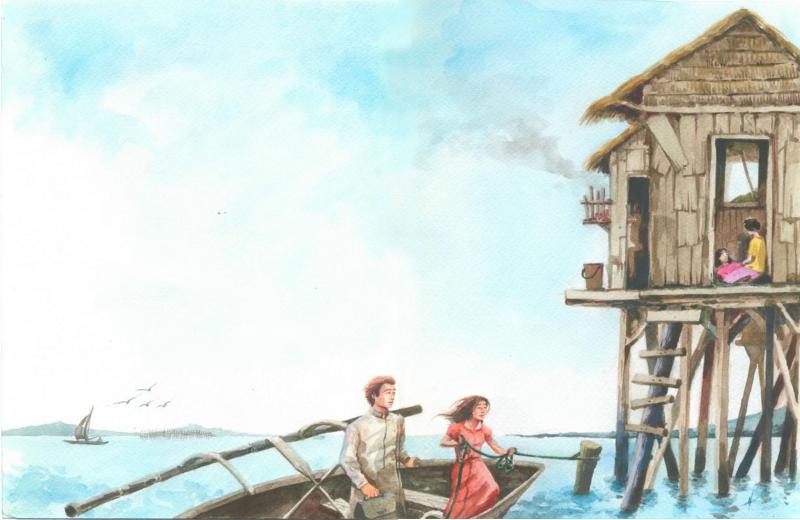
May in Mindanao is a hot month. For the priest it’s also a busy one. That day there had been a barrio fiesta. The barrio wasn’t large but had done its best to celebrate the feast day of its patron, San Isidro Labrador, with becoming solemnity. Almost every house had put on a feast. Visitors came from far and near. The late Mass was sung. A band accompanied the long procession immediately following the statue of the San Isidro. The statue itself was attached to a float and carried over the fields on the shoulders of four able-bodied farmers. Then a large number of children from the village were baptized.
Magnificent in its own way, but fatiguing. It was with a feeling of relief that I neared home. It was a couple of hours’ journey and the sun blazed down fiercely enough to split the rocks along the uneven track. As home came in sight I saw a small girl standing at the door of the sacristy. She came quietly over to the house as I eased myself from the saddle. In a cheerful voice that belied my inner feelings, I asked her what her message was.
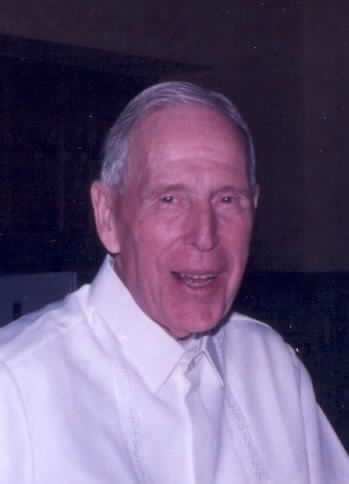 It was scarcely necessary to ask. May, besides being a month of barrio fiestas, catechism classes and special devotions, is also a month for sick calls. And Mercedes, for such was her name, came to fetch me for her eldest sister who was ill. The illness was aggravated by diwindis - perhaps we could call them fairies. It’s seldom you hear of diwindis, but they can be very real to a person suffering from nerves.
It was scarcely necessary to ask. May, besides being a month of barrio fiestas, catechism classes and special devotions, is also a month for sick calls. And Mercedes, for such was her name, came to fetch me for her eldest sister who was ill. The illness was aggravated by diwindis - perhaps we could call them fairies. It’s seldom you hear of diwindis, but they can be very real to a person suffering from nerves.
There were the usual preliminary questions. Is the case urgent? Yes. Where is the house? About an hour’s paddling along the bay. Do you have a boat? Yes. It took a few minutes to pack the sick call kit and place the Blessed Sacrament in the pix. Then Mercedes was leading me towards the baybay. Reaching it, she indicated her boat – a little canoe-like structure with outriggers on either side, known in that district as a tango. We slid this light shell along the mud till we reached water deep enough for it to float with the two of us aboard.
It was only then that I began to see something unusual in Mercedes. It is very seldom that a small girl will be sent to fetch a priest on a sick call. And never before had I been conducted by boat to a sick call when the complete crew of the boat was a small girl. And be it said to my shame, that she was the complete crew and I only a passenger. For when I insisted on taking the paddle for a stretch, I surrendered it in jig time to avert a capsize.
We paddled quietly along. Yes, obviously, Mercedes was an unusual girl, quiet, competent and self-possessed. My admiration for her grew by bounds as, with great economy of words, she told a little bit of herself and her errand. She was eleven. She had not yet made her First Holy Communion. She had gone to school only for a few years, but it was to state school. She knew her prayers and recited them everyday. Some time during the War she had seen the nuns and knew that they conducted a school in a nearby city. Her sister had eloped and gone through some form of marriage – not before a Catholic priest. Now this sister was at home seriously ill. It took one or two people constantly to hold her down. She could see a phantom pursuing her.
No neighbors were sufficiently interested to call the priest so Mercedes had got a tango and set out herself.
The house was built over the sea. Mercedes moored the boat to one of the poles that supported the house and we climbed from the tango to the kitchen. I attended to the spiritual needs of the patient and had the comfort of seeing her fears abate.
That was the last I saw of Mercedes. Her work was done. It was growing late in the afternoon. A strong wind had blown up and two men from neighboring houses paddled me home. They may not have been sufficiently interested in the patient to fetch me, but with their innate respect for the priest, they were more than ready to see him safely home. And it proved to be hard work. Against the tide and the wind it wasn’t easy to paddle. And they had to take a larger, heavier boat because the bay was now troubled with white caps.
My companions took back some prayer books, medals and pictures for Mercedes and her sister. The sister recovered. I was shifted to another parish shortly after this incident and heard news only at rare intervals. Of Mercedes I heard no more except that in later years she married.
Apart from the consolation of meeting one so young and yet with so great an appreciation of spiritual things, the incident stands out in my mind chiefly for a remark of Mercedes as we paddled to the sick call. She said with great seriousness, ‘I wish I could go to the Sisters’ school.’ ‘Why?’ I asked. ‘So that I could be innocent,’ she replied.
There are many, many like Mercedes in the Philippines and elsewhere, with the same wish, the same hunger to be in an atmosphere of prayer and devotion to our Immaculate Mother. And all of us yearn to satisfy the hunger of these youngsters. God grant that we may be able to help the missions more and more to fight this great fight.